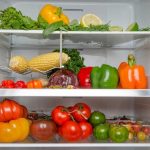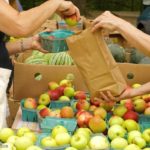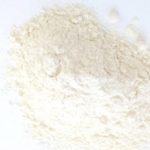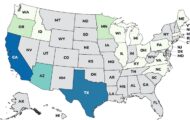Do you know food safety rules for baking in the kitchen? You may know to handle eggs carefully and to bake cookie doughs and cake batters before eating them, but do you know why? With a new E. coli outbreak linked to cake mix, these rules are more important than ever. Many people know that raw eggs can contain pathogenic bacteria, and think that's why food safety experts say not to eat raw cookie dough and cake batter. But eggs are not the only safety issue when baking. As improbable as it seems, flour is a raw agricultural product and not only can it be contaminated with pathogens, it has caused several multistate food poisoning outbreaks in the past few years. All-purpose, cake flour, and bread flour are made from wheat, which is grown in fields. And like all foods grown … [Read more...]
Stay Food Safe During Temporary Power Outages With USDA Tips
Did you know that weather-related power outages have increased by 67% since 2000? Aging infrastructure and climate change are stressing our power grid. Because of the increased energy demand, some power grids can experience blackouts. And of course, severe weather can cause extended power outages. Brownouts can also occur when electric providers ask consumers to voluntary conserve energy or a reduced flow of electricity will be scheduled. So learn how you can stay food safe during temporary power outages. To stay food safe, always keep and appliance thermometer in both your refrigerator and freezer to make sure that the temperature stays below 40°F in the fridge and below 0°F in the freezer. Food will stay at a safe temperate run the fridge up to four hours during a power outage. In … [Read more...]
Are You Ready For a Hurricane? Get Tips From the FDA
Are you ready for a hurricane? With the news of Tropical Depression Fred wreaking havoc on the east coast, and Tropical Storm Henri on the horizon, now is the time to prepare if you live in a hurricane zone. These tips apply across the country in any type of severe weather. The FDA has great tips and information you need to know. These storms can cut off water supplies and threaten the food supply. Before a storm, make sure you have thermometers in your refrigerator and freezer, and stock up on coolers, frozen gel packs, and dry ice to keep reefrigerated food at or below 40°F and frozen food at or below 0°F if you lose power. And stock up on bottled water and nonperishable food and put it as high up on shelves as you can in case of floods. Also make sure you have a manual can opener … [Read more...]
Farmers Market Food Safety Helps Prevent Foodborne Illness
It's National Farmers Market Week. That means it's also time to focus on Farmers Market food safety. When you visit a farmers market, you can find the freshest produce and sometimes meats and eggs, and you can learn more about these products and how to cook them. But you must remember that any food, even vegetables and leafy greens, can be contaminated with pathogens that can make you sick. There are more than 8,000 farmers markets across the country. During the COVID-19 pandemic, farmers markets were an essential source of health food for many communities. But how safe is the food you buy at farmers markets? It depends. There are some warning signs to look for and ways to protect ourself. Most farmers markets do not offer food washing stands, so it's a good idea to bring … [Read more...]
Do You Know That Raw Flour Can Contain Dangerous Pathogens?
A study published in the Journal for Food Protection found that most people treat flour as if it is safe. But do you know that raw flour can contain dangerous pathogens such as E. coli and Salmonella? In 2019 there were many recalls of flour for possible E. coli contamination, including the brands Robin Hood, Gold Medal, Wild Harvest, Hodgson Mills, Pillsbury, and King Arthur. And an E. coli O26 outbreak that sickened at least 21 people in nine states was linked to ADM Milling flour, which produced Aldi, Pillsbury, and King Arthur flour. The study, which was a survey conducted online by participants recruited in May 2019, found that consumers do not consider flour a high risk for microbial contamination. More than 80% of those surveyed were unaware of flour outbreaks or relays, … [Read more...]
Summer Food Safety tips from the North Dakota Department of Health
Summer food safety tips are being offered by the North Dakota Department of Health. Proper food handling and preparation can go a long way towards preventing illness this summer. Pathogens grow more rapidly in hot weather. Perishable foods can harbor these dangerous bacteria, and can make you sick if food isn't properly cooked or is held at unsafe temperatures. Food safety recommendations include: washing your hands and surfaces often, keeping fresh produce separate from uncooked meat, poultry, seafood, and eggs, and always rinsing fresh fruits and veggies under clean running water before preparing or eating them. You should also strive to keep hot food hot and cold food cold. The danger zone is between 40°F to 140°F. In this range, bacteria grow rapidly and can double in … [Read more...]
Little Known Safe Grilling Tips to Prevent Foodborne Illness
When it comes to summer grilling, we are bombarded with information about how to keep the food you are cooking safe. Everyone knows (or should know) about safe final internal temperatures, to wash your hands before cooking and after handling raw meats, and to follow expiration dates on these products. But there are little known safe grilling tips to prevent illness. For instance, did you know that you can get sick if you don't handle marinades properly? Any marinade that has come into contact with raw meat will instantly become contaminated with pathogens. Vinegar or lemon juice in marinade will not kill these pathogens. So if you are using a marinade, handle it carefully. If you want to use some for dipping or to marinate vegetables, make the marinade, reserve some in another bowl … [Read more...]
Food Safety Tips During Hurricanes and Severe Storms
With the first named Atlantic hurricane approaching the U.S. mainland, the USDA is offering food safety tips during hurricanes and severe storms. The best thing to do is to be prepared before storms hit. And this advice applies to all Americans, not just those who live in hurricane-prone areas. First, make sure that you keep an appliance thermometer in your refrigerator and freezer. The freezer must be kept at 0°F or below, and the refrigerator between 33°F and 40°F to slow down most bacterial growth. Then, freeze containers of water for ice to help keep food frozen in the freezer or cold in the fridge or in coolers if the power goes out. Make more ice cubes too. You can also use this ice for drinking water if flooding occurs and you need a clean source of water. Freeze … [Read more...]
Fourth of July Food Safety Tips From the USDA to Stay Safe
These Fourth of July food safety tips from the USDA will help you and your guests stay safe to enjoy the long holiday weekend. Follow basic food safety tips, and add those that apply when you are cooking and eating outdoors, especially in hot weather. First, start by always washing your hands with soap and water before you start cooking and before you eat. Learn how to properly wash your hands. Second, keep raw meats, poultry, seafood, and eggs away from foods that are eaten uncooked, such as produce and salads. Use separate and different colored cutting boards for meats and for fresh fruits and vegetables, and yet another for cheeses, which can be contaminated with bacteria. If you are grilling outdoors, follow the rules for safe grilling, including not grilling inside, in a … [Read more...]
Ten USDA Tips To Keep Restaurant Leftovers Safe at Home
The USDA is offering ten tips to keep restaurant leftovers safe when you take them home. Now that the COVID-19 pandemic is easing, more people are going out to eat. But how you handle doggie bags can have an impact on your health. Firsts of all, if you are having dinner before going to a movie or shopping, do not take leftovers. Perishable food needs to be refrigerated within two hours after it comes out of the oven or fridge. Since it probably took you about an hour to eat, you don't have much time to refrigerate the food. Second, bring the food directly home. The faster you get it into the fridge, the lower the chance that bacteria will grow. Third, you can refrigerate meat and poultry leftovers at 40°F or below for four days. Eggs and lunch meats can be stored in the fridge … [Read more...]













